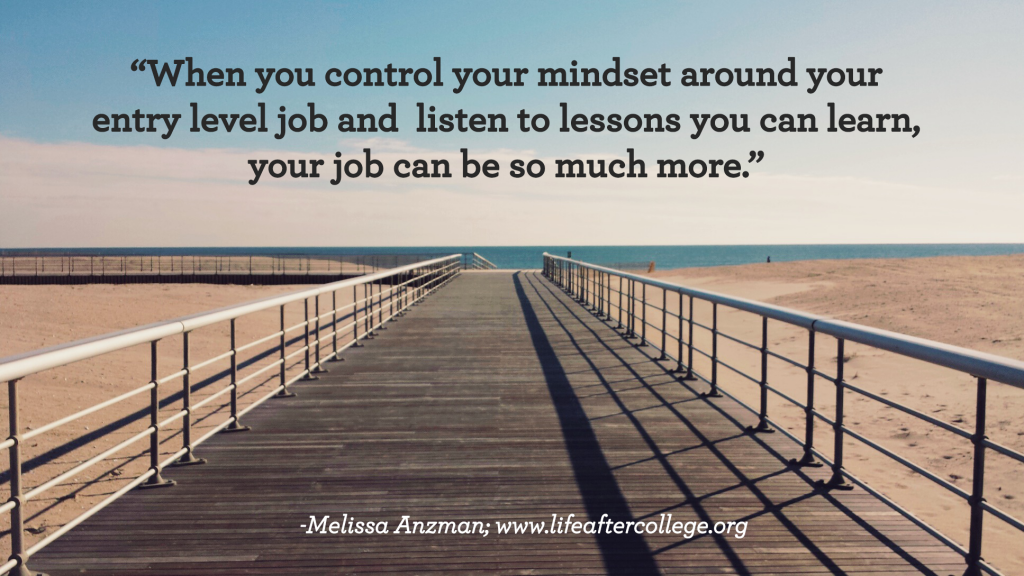Written by Melissa Anzman

No one likes starting at the bottom – and yet, to build your career, you have to start somewhere. Your first real job may seem like a waste of time or a noose holding you back from what you’re supposed to do. But it can be so much more.
My first “real job” out of college was working at a jewelry manufacturing company in account management and sales – also known as doing everything that no one else wanted to do. Including, ahem, putting price tags on the items and stringing pendants. It was as bottom as you can get.
It was miserable, I’m not going to lie. I felt entitled to do more, be more, to not be the grunt person. And that’s where I went wrong. I was so wrapped up in how much better I thought I was than the job, that I missed many important lessons that I had to relearn later in my career.
When you’re in an entry level job, you can make it better than it sounds – and here’s how.
1. Plan your next two steps
I’m a fly-by-the-seat kind of gal for most things, but when you are just starting out in your career, having an idea or hope as to where you want your career to (realistically) be in the next two moves, is critical. It’s too easy to be aimless when you don’t quite have enough experience to be known for something, and are just too recent a grad to know nothing.
When you have your career plan in mind, you can start creating your map to get there and begin learning the tools and lessons you need for each step along the way. Know that your steps will probably change – and that’s ok, it’s about starting with a vision.
2. Create your toolbox checklist
Based on your forward-thinking plan, create a checklist of skills and tools that you will need to get you there. College is great for helping you learn, grow, try things out, and become a functioning human being – but it’s not so great with on-the-job “real life” experience training.
There will be HUGE gaps that will pop-up between your education and what you are expected to do at work. Figure out what those gaps are through research and being an awesome interviewer, and add them to your checklist.
For example, if you want to have a career in publicity, you will learn that the communications courses you took in school didn’t necessarily teach you how to customize pitches for different audiences or people; how to get a call back or an answered phone; how to find the right person; and how to use niche software to find your audience. These are four areas that you can add to your checklist of “tools to learn.”
3. Ask questions and make mistakes
Your entry level job is where you can make mistakes – it’s scary and can be stressful, but it’s sometimes the best way to learn. And I hate to say this, but it’s also where you are expected to make mistakes.
You have lack of knowledge and experience working for you when you are starting out – so leverage that. Ask questions about everything that doesn’t make sense to you and learn the information through other people’s experiences.
Try and ask at least a few big questions a week – and build your toolbox with knowledge and skills. It can be a game, making copy-machine duty not as dull.
4. Everyone started somewhere
I remember thinking in my first job, that that is my “start.” That at some point in the proverbial future when I would retell the story of my career, I would always look back to the jewelry manufacturing position as something I conquered.
Your first few jobs are your starting point. Sometimes the more awful the place or duties, the better the story is later on. The more lessons in skill and personal knowledge will come from it.
Says the girl who didn’t have internet because the company was afraid of... the internet and email – now can you see why I don't prefer the phone?
5. It’s your launch pad
The easiest way to make your entry-level job better than it is, is to use it as your launch pad to what’s ahead. If you are engaged with your work, your boss, your team, your company – you can create the type of job you want it to be.
In other words, you can take your own destiny back through delivering and adding more value. Don’t see your entry level title or job duties as limitations, but as the expectation boundary – then you know everything above and beyond that is more.
When you control your mindset around your entry-level job and to listen to lessons you can learn, your job can be so much more.
We’d love to hear from you in the comments below: What was the best lesson you learned from your entry-level job?
About Melissa
Melissa Anzman is the creator of Launch Your Job where she equips ambitious leaders with practical ways to grow their career. She is the author of two books: How to Land a Job and Stop Hating Your Job. Follow her @MelissaAnzman.
